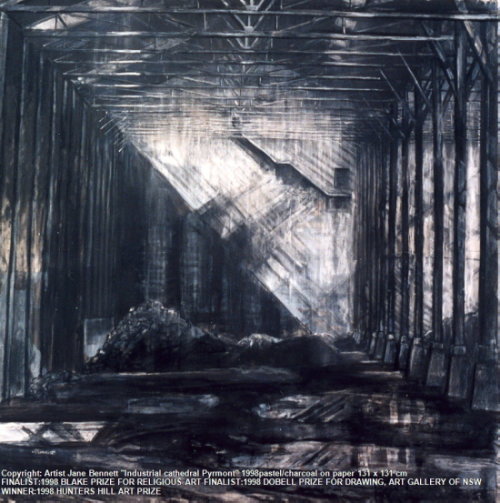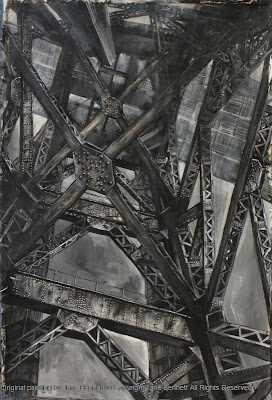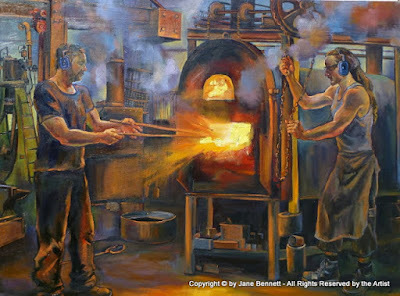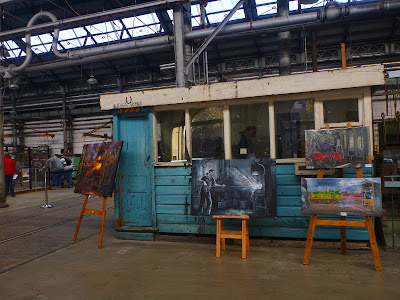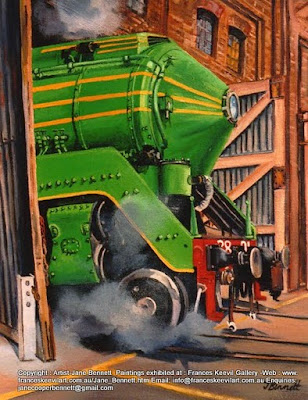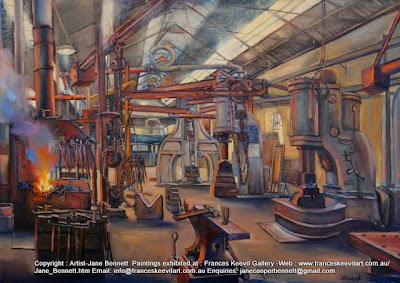No way in, & no way out.
No way up & no way down.
High above street level and clinging to
the northern end of the sandstone escarpment fringing Hickson Road in Millers Point, is a stairway to nowhere.
The entrance and exit are totally bricked-up.
Everyone has heard of 'ghost signs' - but these are 'ghost stairs'.
Where are these spooky steps meant to lead? 2014 acrylic on canvas 31 x 26cm
It just sits there embedded in
the sandstone.
No-one can climb
into the section in the centre, as the base is totally bricked-in.
Presumably it wasn't fully bricked up because of financial considerations, & the partial enclosure would serve to prevent even the most determined parkour enthusiast from climbing to the top.
'Tomason' aka Thomasson or Hyperart Thomasson (Japanese: Tomason トマソン or Chōgeijutsu Tomason 超芸術トマソン) is a type of conceptual art named by the Japanese artist Akasegawa Genpei , a member of a Japanese art & architecture collective formed in 1986 known as Rojo Kansatsu (Roadside Observation). It's a term for useless, abandoned leftovers, which have been inadvertently preserved & even maintained as unintentional art created by the city itself. They are strange & haunting vestiges of the incessant churn of building, destruction, and redevelopment that characterizes the city. The equivalent of a human appendix or the vestigial remnants of tiny non-functional limbs on a snake's skeleton.
The inspiration for the term was Gary Thomasson, a baseball player signed with great fanfare & given a huge contract, but who put in a such a disappointing performance that his name became a byword for uselessness. His position on the team was a fitting
analogy for "an object, part of a building, that was maintained in good
condition, but with no purpose, to the point of becoming a work of art." A 'Stairway to nowhere' is a type of 'Tomason' also known as a "Pure Staircase"(Japanese: Muyō kaidan 無用階段
)
It makes a quirky counterpart to 2 fully functional steps at opposite ends of the wharf precinct - High Steps & Agar Steps. The High steps were
cut into the cliff face at the southernmost end of High Street. Agar Steps is on the western side of Observatory Hill, connecting Kent Street and Upper Fort Street. They were designed as a
continuation of Agar Street, (now High Street) named after Thomas Agars, a merchant and City councillor. Originally called the Flagstaff Steps, Agar Steps was built to provide access to the Model School &Sydney Observatory.During the early 20th century, the streetscapes of
Millers Point were in a state of turmoil subsequent to large scale resumption by the
Government as part of its program to eradicate the Bubonic plague.
By the 1920s whole streets had disappeared, new cliff faces had been
carved into the bedrock and hundreds of houses were demolished & replaced. Quarrying to sea level along Hickson Road resulted in the creation of a platform carved into the exposed sandstone, creating a new urban terrace, 'High
Street' by the Sydney Harbour Trust.
The stairs cling to the wall above Hickson Road, leading up towards High Street & the
deck of one of the three bridges built across Hickson Road.
The three bridges which carry Argyle, Munn and Windmill Streets over Hickson Road are rare examples of Monier Arch bridges. They were constructed along with the cuttings and other civil works in the area between 1910 and 1914 as part of the redevelopment of Walsh Bay by the Sydney Harbour Trust. For the time, they were controversial & cutting edge technology as they were some of the earliest bridges to be built in Sydney using a new material called ferro-concrete (now known as reinforced concrete).
The three bridges which carry Argyle, Munn and Windmill Streets over Hickson Road are rare examples of Monier Arch bridges. They were constructed along with the cuttings and other civil works in the area between 1910 and 1914 as part of the redevelopment of Walsh Bay by the Sydney Harbour Trust. For the time, they were controversial & cutting edge technology as they were some of the earliest bridges to be built in Sydney using a new material called ferro-concrete (now known as reinforced concrete).
The stairway to nowhere is a relic left over from the construction of the Monier bridge over Argyle street.
Yesterday, upon the stair,
I met a man who wasn't there
He wasn't there again today
I wish, I wish he'd go away...
When I came home last night at three
The man was waiting there for me
But when I looked around the hall
I couldn't see him there at all!
Go away, go away, don't you come back any more!
Go away, go away, and please don't slam the door... (slam!)
Last night I saw upon the stair
A little man who wasn't there
He wasn't there again today
Oh, how I wish he'd go away...
'Antigonish (I met a man who wasn't there)'
by Hughes Mearns
Except it was the stair that wasn't there.In metaphysics, a paradoxical argument by Willard Van Orman Quine
in his 1948 paper "On What There Is" used the phrase 'Plato's beard' as a term for the philosophy of understanding something based on what does not
exist.
'Plato's beard' may blunt 'Occam's Razor'.
Related Posts
